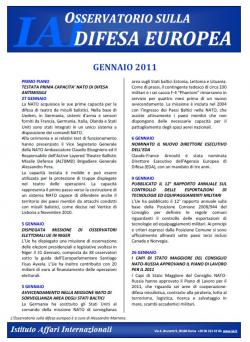Observatory on European defence, June 2009
June 4, 2009
A MECHANISM FOR EXCHANGING INFORMATIONS ON FORMER GUANTANAMO DETAINEES
The Justice and Home Affairs Council outlined a framework procedure for exchanging informations on former Guantánamo detainees who could be received in European states. Since January, Member States have been discussing whether or not to grant asylum to former Guantánamo detainees discharged with no indictments, but who cannot go back to their countries of origin for security reasons. The decision is a matter for each individual Member State but also concerns them as a whole, as prospective former detainees hosted in one European state might then move to another. The mechanism approved by the Council intends to dampen concerns arising from such displacements. It entails a preventive exchange of information between the US and the hosting State on individual detainees, and a subsequent exchange of information between all European countries.
June 11-12, 2009
MEETING OF NATO DEFENCE MINISTERS
NATO Defence Ministers met in Brussels for the first time after the Strasbourg-Kehl summit. The ISAF mission in Afghanistan, the long-standing highest priority of the Alliance, was at the core of the 2-day meeting. The Ministers agreed on a reorganization of the ISAF command: military operations and training of Afghan security forces will be placed under two different chains of command, both with an American officer at the top.
The new American Commander in Afghanistan, Stanley McChrystal, is going to be responsible for all operations. This concentration of authority in American hands reflects the numeric preponderance of American troops. Currently there are about 28,000 American soldiers out of an ISAF total of 61,000 men. When the reinforcements decided by President Obama will be deployed, US troops engaged in Operation Enduring Freedom alone will number almost 68,000. The Ministers also confirmed the decision to send temporarily an additional contingent of 8 battalions (about 10.000 units) to strengthen security measures during the presidential and provincial elections to be held in August. Some arrangements were also made with regard to preparation of the NATO Training Mission in Afghanistan, established during the Strasbourg-Kehl summit.
An intermediate command post responsible for the performance of the military missions will be created in order to ease the workload of the ISAF command, freeing it of the management of training activities and development projects and coordination between Afghan and international authorities.
NATO KFOR in Kosovo will be downsized and will decrease from 14,000 to 10,000 units. This has been made possible by the improved security conditions and the maturity of the Kosovo Security Force (the local military force), and coincides with the KFOR's transition to a pure deterrence phase (troops will no longer have an active role in maintaining public order). Italy has already announced the withdrawal of half of its 1935 soldiers, while Spain confirmed the withdrawal of its entire contingent (542 men) by September.
Security conditions permitting, KFOR will gradually be downscaled to 2,200 units within two years.
In addition, the Ministers decided to maintain a naval presence in the Horn of Africa. The Standing NATO Maritime Group 2 (SNMG2) was therefore sent to the operation area at the end of June as a replacement for SNMG1, engaged in the Allied Protector counter-piracy operation until June 28.
June 15-16, 2009
EU COUNTER PIRACY OPERATION EXTENDED FOR ONE YEAR
The General Affairs and External Relations Council extended the mandate of the counter-piracy operation Atalanta off the Somali coast for one year. The mandate would have expired on December 13. The Council decided to approve the extension of the mission because of the seriousness of the piracy problem in the future as well. The approval in advance of the extension of the mandate is meant to facilitate the force generation process for the following phases. Also, the mandate of the Eusec RD Congo mission, which assists local authorities in security sector reform and was due to expire on June 30, was extended until September 30.
The Council moreover approved a Presidency report on Common Foreign and Security Policy and another on European Security and Defence Policy. The latter was submitted for approval to the European Council held on June 18-19. The Council also took note of a report on the training of ESDP mission personnel and a report on conflict prevention activities adopted by the European Council.
A few days earlier, the Transport Council extended the mandate of the Eujust Lex Iraq mission for one year (the operation will end on June 30, 2010). Eujust Lex also started its first activities on Iraqi territory (training courses for policemen, judges and penitentiary officers). Eujust Lex activities have until now taken place out of the country for security reasons.
June 24, 2009
ACTION PLAN AGAINST CBRN THREATS
The European Commission approved an action plan against chemical, biological, radiological, and nuclear (CBRN) threats. The plan, framed on a 3-year basis, contains 133 measures to prevent and detect threats, as well as to strengthen the preparation and reaction capabilities of the authorities of the EU States.
-
Details
Roma, Istituto affari internazionali, 2009 -
Issue
09/06



